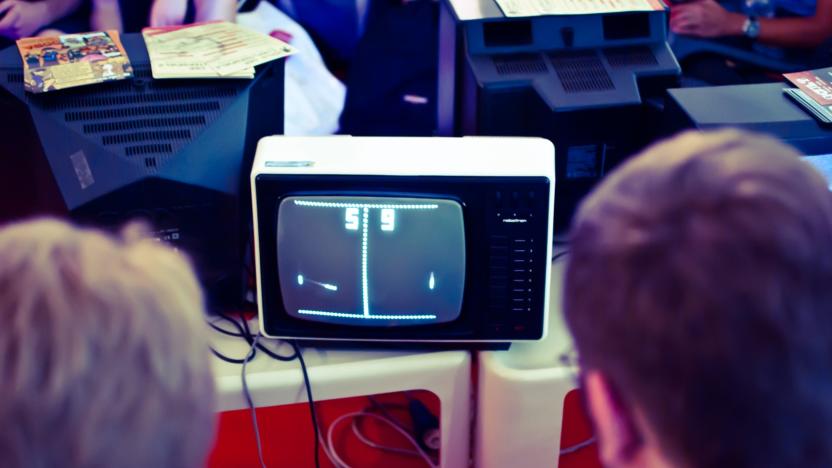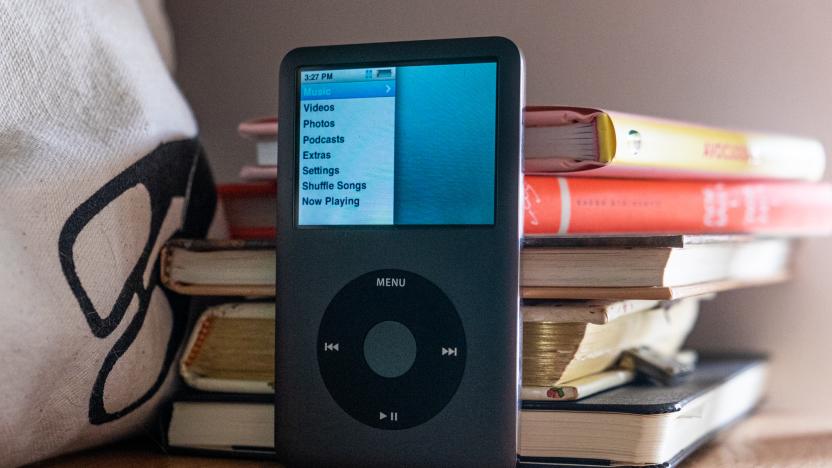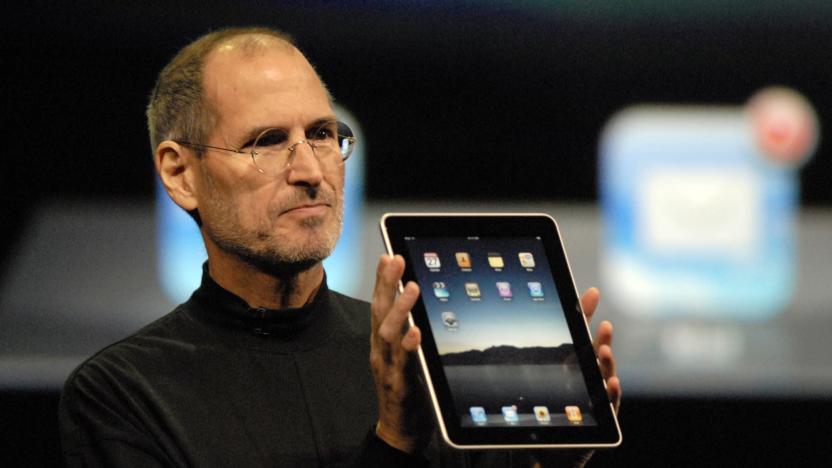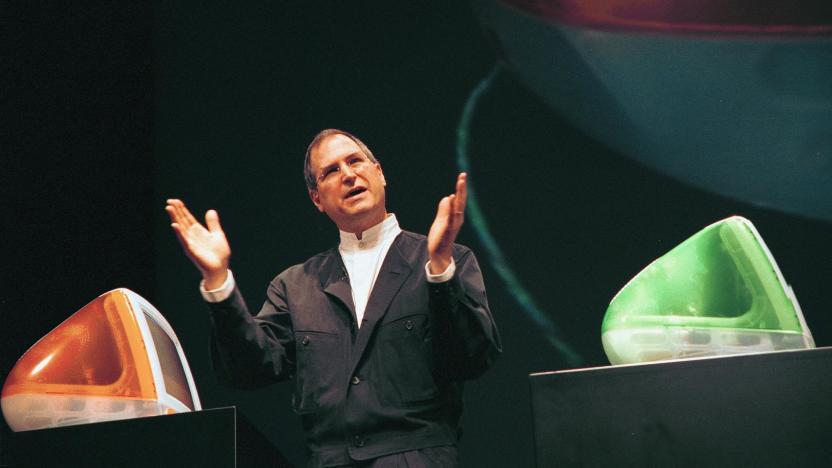Steve Jobs
Latest

'Pong' is now half a century old
Exactly 50 years ago today, Atari released Pong.

Biden will posthumously award Steve Jobs the Presidential Medal of Freedom
President Biden announced the first slate of MoF recipients of his administration on Friday, a list that includes former Apple CEO, Steve Jobs.

20 years ago Apple introduced the iPod, the perfect gateway drug to the Mac
The iPod was first announced 20 years ago, on October 23, 2001.

The iPad hasn't killed laptops, but Apple will keep trying
Ten years ago, Steve Jobs introduced the last all-new product line that Apple would launch in his lifetime. Initially, the iPad was mocked for its name and derided as a "giant iPod touch." But it caught on quickly with the public and inspired a host of copycat devices, none of which had the same impact as the iPad.

The tech CEOs' year of reckoning
It wasn't so long ago that tech CEOs and their wares were changing the world. In fact, we heard that quite often: This or that "innovation" will make the planet a better place. Silicon Valley was clearly getting high on its own supply as it ramped up the hype that the earth was a wasteland until the titans of tech had graced us with an easier way to post a filtered photo or share our thoughts on the finale of Lost.

Apple's bulbous, colorful iMac went on sale 21 years ago today
At Engadget, we spend every day looking at how technology will shape the future. But it's also important to look back at how far we've come. That's what This Week in Tech History does. Join us for a recap of historical tech news, anniversaries and advances from the recent and not-so-recent past. Today, Apple's first iMac is a whopping 21 years old.

Now that YouTube has jumped to HTML5, here's what Steve Jobs said about Flash
Today, YouTube announced it will now default to HTML5 when a video is loaded rather than using Flash. For years, Apple has been criticized for not allowing Flash on its iOS devices, leading Steve Jobs in April 2010 to release an open letter explaining Apple's position on the subject. You can read the whole letter here. Inside, Jobs addresses the technical issues associated with Flash and Adobe's criticisms of Apple for not using the platform. In light of YouTube's transition to HTML5, however, it's worth pointing out the close of the letter: Flash was created during the PC era – for PCs and mice. Flash is a successful business for Adobe, and we can understand why they want to push it beyond PCs. But the mobile era is about low power devices, touch interfaces and open web standards – all areas where Flash falls short. The avalanche of media outlets offering their content for Apple's mobile devices demonstrates that Flash is no longer necessary to watch video or consume any kind of web content. And the 250,000 apps on Apple's App Store proves that Flash isn't necessary for tens of thousands of developers to create graphically rich applications, including games. New open standards created in the mobile era, such as HTML5, will win on mobile devices (and PCs too). Five years later, it's interesting to see this transition continue to take place, this time at one of the most popular websites in the world. Head over to Apple's site for the complete text of the letter.

How Steve Jobs responded when someone called the iTunes logo an abomination
In a recent report from the camera app Ice Cream, the company shared a story about a member of its team emailing Steve Jobs with a graphic design opinion in 2010. More specifically, the developer's opinion was that Apple's new logo for iTunes was an "abomination." Jobs, who was known to be up to responding personally to unsolicited emails, sent him the following reply. That was certainly a very polite way to shoot down that idea.

Daily Roundup: Windows 10, weak passwords, SpaceX and more!
Microsoft will unveil Windows 10 to the masses tomorrow, giving us a closer look at what the folks in Redmond have been working on. Meanwhile, everyone on the internet is still using weak passwords like "123456" and Google decided to drop some serious money on SpaceX. Get all the details on these stories and more in today's daily roundup.

First iPhone keynote was eight years ago today
I never had the privilege of watching Steve Jobs do his thing in person. Instead, I watched his public presentations as many of you did: seated before a glowing computer screen, eager for what was about to unfold. The event I remember most clearly took place on January 9, 2007. Steve took the stage to introduce a product that would change personal technology significantly. I still get chills when Steve does the "These are not three separate devices" bit. Today we know that the iPhones Steve used on stage weren't fully functional, and the threat of his demo going catastrophically wrong was very real. As The New York Times reported in 2013, engineers found a specific progression of tasks that would work, if they were executed in a precise order on stage: "The iPhone could play a section of a song or a video, but it couldn't play an entire clip reliably without crashing. It worked fine if you sent an e-mail and then surfed the Web. If you did those things in reverse, however, it might not. Hours of trial and error had helped the iPhone team develop what engineers called 'the golden path,' a specific set of tasks, performed in a specific way and order, that made the phone look as if it worked." The fact that Steve's fifteen-minute demo went as well as it did is practically a technology miracle. You can watch the historic presentation below.

Steve Jobs' supervillain yacht is chilling in the British Virgin Islands (not New England)
The massive yacht Steve Jobs helped design -- and which launched a year after his passing -- was recently (?) spotted looking like an amphibious Apple Store off the coast of Norman Island in the British Virgin Islands. The new photos show the ship, named Venus, with its sides and rear deck open for the first time on camera. The latest snapshots of the ship were posted to the Woods Hole Inn Instagram account. Woods Hold Inn is located in Massachusetts, which has led many outlets -- including Time -- to declare that Venus is visiting New England. Of course, by the weather, mountainous shoreline, and abundant greenery it's pretty clear that the photos were not taken in January on the east coast of the United States. Oh, and the photos actually say that they were taken in the British Virgin Islands, so that helps too.

Judge denies request to release video of Steve Jobs deposition
Just one day after Apple emerged victorious in its iPod antitrust lawsuit, Judge Yvonne Gonzalez Rogers ruled that there was no overwhelming "public interest" in releasing videotaped deposition testimony of Steve Jobs taken a few months before his passing. Earlier in the month, a trio of news organizations -- Bloomberg, CNN, and the AP -- filed suit seeking to have video of the deposition released. Apple naturally opposed the motion, arguing that it amounted to nothing more than exploiting a dead man for no beneficial reason whatsoever. Rogers' reasoning reads in part: The Court is mindful of the public interest in the video testimony at issue and in the importance of the presumption of public access to judicial records. The Court also recognizes the public policy concern raised by defendant, namely that if releases of video depositions routinely occurred, witnesses might be reticent to submit voluntarily to video depositions in the future, knowing they might one day be publicly broadcast. If cameras in courtrooms were not currently prohibited, the argument might have less weight. However, given the lack of authority approving such a release, the concern is well-taken that under the current rules, deponents have no expectation or notice that the videos will be disseminated beyond the presentation during trial. If the video had been introduced as a trial exhibit, or if no objection had been lodged, the ruling on this motion might be different. In light of the present circumstances and the lack of legal authority justifying the Media Intervenors' request, however, the Court will not authorize the copying of the Jobs Deposition. The ruling in its entirety can be read below, courtesy of Apple Insider. Ruling Denying Media Intervenors Access to Jobs Deposition by Mikey Campbell

Apple I sells for "only" $365,000 at auction
With the original Apple computers - AKA Apple I or Apple-1 - being as scarce as the proverbial hens teeth, prices for the units hand-built by Steve Wozniak and sold by Steve Jobs have been soaring into the stratosphere. As an example, in October of 2014, the Henry Ford Museum purchased an Apple I for US$905,000. Well, yesterday a working Apple I was sold by Christies auction house for a paltry $365,000. Out of the 200 or so Apple I units produced in the early days of Apple, only 63 are known to exist and the majority of those are no longer in working order. We're not sure why the device sold yesterday - which was apparently in mint condition - was such a relative bargain. That selling price represents an increase in value of more than 547 times the original Apple I retail price, which was $666.66. That's not a bad return on investment if the computer was sold by its original owner, although he/she would have done much better to invest that money in Apple stock back when the company went public in 1980.

Apple fires back hard at news organizations for demanding to see Steve Jobs depo video
As anticipated, Apple has taken an extremely strong stance against a request from three news organizations to see the release of a videotaped deposition of Apple co-founder Steve Jobs. The deposition itself was conducted in April of 2011, a few months before Jobs passed. A motion from the news organizations involved in the request -- Bloomberg, CNN, and the AP -- argues that releasing the video is in the public interest given Jobs' position as a notable and recognizable figure of influence. Apple of course, which has a long history of being protective of Jobs' image and likeness, sees things much differently. Mincing no words, Apple lawyers categorized the request as exploitive while adding that it serves no necessary purpose. On Tuesday, reporters for The Verge were in attendance when Apple's lawyers presented their position before US district court judge Yvonne Gonzalez Rogers. Apple's lawyer Jonathan Sherman, a partner at law firm Boies, Schiller, and Flexner accused Burke and the media companies of being opportunistic during a hearing in Oakland's federal court building this evening. "The marginal value of seeing him again, in his black turtleneck - this time very sick - is small," Sherman said, contrasting that with high-profile appearances like Apple product releases, and when Jobs stumped for a new campus at a city council meeting in Cupertino. "What they they want is a dead man, and they want to show him to the rest of the world, because it's a judicial record." Burke replied by saying it was not a frivolous request, and calling the testimony "invaluable." Judge Rogers hasn't yet ruled on the issue and it'll be interesting to see where she lands on the matter.

News organizations fight to have tape of Steve Jobs video deposition released to the public
During Apple's ongoing iPod antitrust lawsuit, the plaintiffs introduced video testimony from Steve Jobs that was recorded in April 2011, a few months before his passing. Per Apple's request to the plaintiffs, Jobs' video footage has not been made public. Now comes word via CNET that a trio of news organizations -- CNN, Bloomberg, and the AP -- are petitioning to have Jobs' video deposition released to the public citing a "public interest" in the footage. "Given the substantial public interest in the rare posthumous appearance of Steve Jobs in this trial, there simply is no interest that justifies restricting the public's access to his video deposition," attorney Thomas Burke, who is representing all three media organizations, wrote in the filing Monday. Apple, meanwhile, plans to vehemently oppose the motion, though it remains unclear, at this point, what legal basis they'll put forth to keep the video free from the public eye. All told, Jobs' video testimony is about two hours long and mostly centers on Apple's contracts with record labels and the company's efforts to maintain strict control over the iPod/iTunes ecosystem. In one particularly interesting excerpt we highlighted earlier in the week, Jobs detailed many of the stipulations from record labels that accompanied Apple's iTunes Music Store contracts, one of which was that record labels reserved the right to remove their music from iTunes if they discovered anyone had hacked Apple's FairPlay DRM. The iPod lawsuit is expected to wrap up this week and, for the time being, is proceeding without a named plaintiff.

In videotaped deposition, Steve Jobs talks DRM and dealing with record labels
Six months before he passed away, Steve Jobs sat down for a videotaped deposition to answer questions connected to Apple's ongoing iPod antitrust class action lawsuit. The lawsuit alleges that Apple improperly enacted measures to render songs downloaded from competing music services unplayable on the iPod. In doing so, the plaintiffs allege that Apple was able to keep iPod pricing higher than it would have ordinarily been otherwise. This past Friday, video footage from Jobs' deposition was played before the court and CNET was there to recap some of the more interesting exchanges. Jobs' take on the matter aligns with what Eddy Cue articulated on the stand earlier last week, namely that the fear of piracy amongst record labels resulted in fairly strict contracts that required DRM to be an integral part of the iTunes/iPod ecosystem. According to Jobs, Apple's contracts with record labels were "black and white." Jobs explained that the contracts, in addition to stipulating that songs needed to be laden with DRM, specified that if Apple's DRM (called FairPlay) was broken or hacked, the record labels could immediately remove their music from iTunes. No questions asked. So when RealNetworks came around in 2004 and reverse engineered FairPlay, thereby enabling music purchased on the RealPlayer Music Store to work on the iPod, Apple took immediate notice and subsequent action. Jobs was also asked about the efforts of competing digital music stores like RealNetworks, a company that developed software called Harmony that would reverse engineer Apple's FairPlay to let iPod owners put RealNetworks' music on their devices. Through iTunes updates, Apple continuously broke Harmony, an action plaintiffs say was anticompetitive because it degraded the consumer experience and was an example of Apple wielding a monopolistic position in the market. Jobs response? Harmony was undermining Apple's end-to-end product ecosystem. "We were very concerned with somebody like Real [Networks] promising customers that they would have compatibility, when in the future they might not," he said. "That's not something we could guarantee. So we could get sued by all these people." Jobs' testimony paints a picture of stringent contracts with record labels that Apple was extremely vigilant about upholding, lest the crown jewel that was the iTunes Music Store suffer an immediate blow to its song library. "There are lots of hackers trying to hack into these things so that they can do things that would put us in noncompliance with the contracts we have with the music companies," Jobs explained. "We were very scared of that." The resulting impact on competing music services is something Jobs alluded to as "collateral damage." All told, the plaintiffs at large are seeking US$350 million in damages. Whether or not the trial will reach a conclusion, though, hangs in the balance. This past Friday Apple filed a motion to dismiss the case altogether after discovering that the two named plaintiffs did not purchase iPods during the relevant time period of the case. A ruling on that motion is likely to be handed down soon.

Steve Wozniak calls Apple's legendary garage 'a bit of a myth'
Apple co-founder Steve Wozniak has never been shy to talk about the company he helped create, regardless of whatever the topic may be. Most recently, in an interview with Bloomberg Businessweek, Wozniak touched briefly on a few topics from the early days of Apple, ranging from the vision of his long-time partner and friend, Steve Jobs, to how many Apple I and Apple II units were sold in the beginning. Wozniak was also asked a question regarding the legendary Apple garage, which has become known as the Cupertino firm's birthplace -- it's an iconic place, to say the least. To this, he said, "The garage is a bit of a myth."

Jimmy Iovine named one of GQ's Men of the Year, talks Apple Beats deal
Jimmy Iovine joined Apple during the $3 billion acquisition of Beats earlier this year, the largest purchase in Apple's history. Needless to say, it's been a good year for Iovine. Now the mogul has been named one of GQ's Men of the Year and in his interview for the award, Iovine gives details on what led to his company's partnership with Apple. For Iovine, the deal was a matter of growth for both Beats and Apple: How did Apple come to buy Beats? I convinced them that they had to buy this company. I said, "I don't want to work for anybody else. I want to do this at Apple. I know I can achieve this at Apple. I don't want to shop it. I wanna come here, to Steve's company. I know you guys; I know what you're capable of; I know you get popular culture. I know you have a hole in music right now; let me plug it." I think it was two years before they said yeah. The "hole" Iovine saw and wanted to plug was Apple's lack of a streaming service in its music division. Apple Radio simply wasn't enough to compete with companies like Spotify. This isn't the first time Iovine has spoken about Apple's need for a streaming service. Back in 2013, when Beats was still known as Daisy, Iovine spoke in interviews about spending years trying to convince Steve Jobs to start his own streaming music service. It's fitting that Beats eventually ended up being the streaming service for Apple.

Old Steve Jobs emails resurface as part of iPod antitrust lawsuit
It's hard to believe that in 2014, we're still talking about the iPod as a monopoly. Hell, it's strange that we're even talking about the iPod at all. But thanks to a slow winding judicial process, a class action suit against Apple stemming from its business practices in the mid-2000s is getting underway today in California. The suit alleges that Apple took pro-active measures to prevent songs from competing music stores from being playable on the iPod. And as one might expect, some of the key evidence in the case comes from Steve Jobs himself, both in the form of old emails and a video deposition the Apple co-founder sat for back in 2011. With the trial getting underway today, a number of statements from Jobs have already emerged. Some point to Apple doing all it can to keep the iPod free from competing music stores while others are simply vintage Jobs. Here are a few of the Jobsian highlights we've seen so far. In 2003, upon learning of a music store called Music Match, Jobs emailed Apple executives to ensure that songs from that store would not be playable on the iPod. We need to make sure that when Music Match launches their download music store they cannot use iPod. Is this going to be an issue? In 2005, plaintiffs point to yet another email from Jobs, this one in response to a start-up working on a product which would have made music not purchased on the iTunes Store playable on the iPod. In an email to Jeff Robbin -- of SoundJam MP fame -- Jobs wrote that Apple "may need to change things here." The New York Times, which has seen many of the documents in question, adds that Robbin and the iTunes team were quick to "develop a stronger security system to prevent unauthorized third parties from injecting content into iPods." Apple, of course, contends that the reason they were so vigilant about keeping an eye on files from other music stores is security. Whether you buy that argument or not, that's what Apple is selling. But back to Jobs because, well, he wasn't your typical CEO. The Times further relays that during Jobs' 2011 video deposition, the Apple co-founder was asked about RealNetworks and their involvement in the music download market. A transcript of the deposition included Ms. Sweeney questioning him about RealNetworks, a company that had come up with a way to allow songs sold in its store to play on iPods and other media players. Mr. Jobs responded "I don't remember" to many of the questions. But when asked whether he was familiar with RealNetworks, he replied bluntly, "Do they still exist?" As the trial progresses, we can likely expect to see quite a few more entertaining quips from Jobs emerge.

Buy the Steve Jobs monument that was too gay for Russia for $95,000
The iPhone-esque Steve Jobs tribute statue that was unceremoniously dismantled in the wake of Tim Cook's public acknowledgement of his sexual orientation is now up for sale in Russia. The statue, which was originally erected in 2011, was designed to honor the accomplishments of Steve Jobs and is aesthetically similar to the iPhone. The monument is being sold by the Russian Holdings Company and has a price tag of 5 million rubles, which comes out to roughly US$95,000. That's a heck of an asking price for what is essentially a large LCD display, but proceeds from the sale will reportedly go to aspiring Russian IT developers. There have been a few conflicting theories as to why the statue was in fact taken down in the first place, though several reports out of the country have claimed it was due to Tim Cook's BusinessWeek piece announcing he is "proud to be gay." Russia's homophobic history speaks for itself, and the sale of the statue seems to further support this theory, as some stipulations on the monument's sale include that it must be taken out of the country immediately and never again erected on Russian soil. [via Vocativ]










